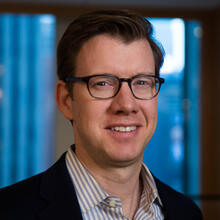On the long ride home, driving south on the New York State Thruway, I marked the time by listening for the slow transition of local radio stations. I listened for a bit to Albany’s local NPR affiliate, but I was eager for the moment, near New Paltz perhaps, when I could pick up WFUV, a public music station broadcasting from Fordham University in the Bronx. I had only been away a short time, but I looked forward to my return, and the crackle of New York City radio was the first signal that I was close to home.
Radio has always served as a homing signal for me. I think it dates to my days in high school when I kept the radio tuned to 92.3 K-Rock (Meg Griffin in the evenings) as I toiled away on my Latin homework. The background noise helped me to concentrate, though I guess I should not be surprised that while the opening lines of the Aeneid now elude me, the opening chords of “Smoke on the Water” are still immediately recognizable.
I went to college in New Jersey, only an hour and a half from home, but I was displeased to find that I was in Philadelphia radio country. The difficult transition to freshman year was made worse by my inability to tune in to Alison Steele or Pete Fornatale. Later, when I moved to Connecticut for a job, I lived alone, but I could still hear WFAN in New York, which allowed me to fall asleep to Mets games or the monologues of Steve Somers. Today, I don’t feel I have arrived home from an airplane trip until I climb in a car and hear the familiar rat-a-tat-tat of 1010 WINS.
If I were in college today, I could listen to my hometown stations on my phone or laptop. Apps like “I Heart Radio” give almost unlimited access to radio outlets from across the country and around the world. Many commercial radio stations may sound similar these days, but stations like WBEZ in Chicago and WHYY in Philadelphia still offer plenty of local flavor. I like tuning in now and then, but the variety is both heady and disorienting. There is almost too much to listen to. Throw satellite radio into the mix, and the choices for today’s listener are almost limitless—Frank Sinatra radio, Grateful Dead Radio, E-Street Radio; the list goes on.
I have experimented with satellite radio, and with Spotify and Pandora too, but I find myself returning to my local radio stations again and again. One reason is habit. The radio hosts on WFUV and WNYC help to set the rhythms of my day. I also respect their judgment, whether they are picking new music or reporting new stories. Pandora is a formidable force, but music by algorithm, while enjoyable in certain circumstances, ultimately feels inadequate to me. Without a human voice to guide me through the rivers of song, I am unmoored.
So I like traditional radio because it’s tied to a person but also because it’s tied to a place. Satellite radio enthusiasts sometimes refer to old-fashioned radio as “terrestrial radio.” That is not meant as a compliment; local radio outlets are aligned with a place and are therefore limited. Their signals reach only so far. But I think that is one of their charms, and one of the reasons I keep tuning in. Listening to satellite radio I could be anywhere in the world. Listening to WFAN or WNYC, I know I am close to home.
Traditional radio is also precious because it is fragile. Your radio can break; the transmitter can be damaged. A struggling station can go off the air at a moment’s notice. But there are also moments of serendipity. Sometimes, when you are lucky, you can catch a signal from a faraway station.
This is one of the plot points of the successful novel All the Light We Cannot See, by Anthony Doerr. Two characters, a boy in Germany and a young girl in France, are tied together by radio, which inexorably brings them together during World War II. Growing up in an orphanage, the boy, Werner, comes across a mysterious radio signal, and listens with rapt attention to the lessons of a nameless French science teacher. For Werner, the radio is both a mechanical object, which he learns to master, and a vehicle for grace, which opens up his life to a new world of knowledge.
Because it is portable, because it focuses attention on the human voice and because it emanates from a specific place, radio holds a special place in the crowded media landscape. It is both intimate and communal, a comforting voice in the dark and a symbol of the ways we are all tied together.








